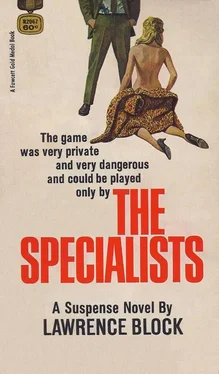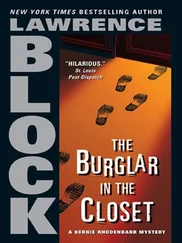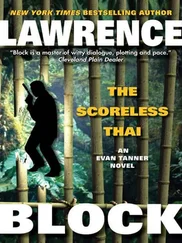But the engine did not catch. The starter motor whirred and whirred and the car shook with the repeated vibration, but there was no spark, no ignition. Give up, Manso thought. Get out of the car before you kill the battery. Go on, you schmuck.
The door opened, the kid got out and trotted off. Manso gave him a few seconds lead time, then began inching his way out from under the car on the passenger side. He crouched at the side of the car, his feet hidden behind a tire. He saw the kid returning with Buddy Rice walking impatiently on ahead of him. The kid was trying to explain and Rice was saying that he was a stupid little prick and he must have flooded it and why the hell couldn’t he learn how to start a car without flooding the goddamned carburetor, and it better start now or he’ll just be wishing that all Mr. Platt does is get him fired, for Christ’s sake.
Rice dropped behind the wheel and ground the starter.
“See, Mr. Rice? It just goes like that, pocketa-pocketa, but it don’t catch. I thought—”
“Not flooded,” Rice said. He hit the hood latch and was around the front of the car almost at once. “Get your ass over here,” he told the kid. “Did you have this hood up? Don’t give me any shit, now, I’ll find out if you did. It’s a big car, a great car, kids like to fool around with cars. You have this hood up?”
“Mr. Rice, I swear by my mother—”
“You got a match? Here, I got one, take this. Light it and hold it steady, for Christ’s sake. I said steady, I can’t see a thing.”
Manso had the knife in his left hand. It was a throwing knife, a hiltless wedge of fine German steel. Knives with hilts were supposed to be better for combat use, but Manso liked this one because it was so easy to conceal. You could tape it to your arm or put it in your shoe, anything, and there was no bulge and nobody knew it was there. He had the knife in his right hand and his left hand was up a few inches in front of his face, the elbow bent sharply in front of him. He moved quickly, silently, away from the car and around in an arc that took him behind the two of them.
“Why, you little shit, look at that! You see that wire? You were playing around and you knocked it loose.”
“I swear, I swear by my mother—”
“Fuck your mother,” Rice said.
That was all he said. Manso chopped once at the back of the kid’s neck, pulling the blow back at the moment of impact and slapping the hand at once over Rice’s mouth. The other hand, the one with the knife, was already in motion. Manso remembered a sentry in Laos, remembered other men who had died noiselessly, and even as the memory flashed in his mind the little wedge of steel slipped neatly between Buddy Rice’s neck and collarbone, slipped neatly in, through the artery, through nerve bundles, neat, easy, like dropping a penny in a slot.
In and out and then the blade wiped back and forth on Rice’s jacket while he lowered Rice gently to the ground. No time wasted checking the kid. He knew he was alive, and he also knew he’d be out cold for ten minutes at the least. He spun, ran, the knife again taped to his arm, the undershirt bunched in his hands. In seconds he was over the fence and running through the yard and down the driveway. He trotted to the Plymouth, started it up, and drove off slowly, resisting the urge to put the gas pedal on the floor.
Buddy Rice had been dead for six minutes when Platt found him. By that time Manso was ten blocks away.
Dehn came back upstairs carrying a small wooden salad bowl. It contained two scoops of ice cream swimming in chocolate sauce and topped with gobs of marshmallow and chocolate mint sprinkles. The colonel looked at it and wrinkled his nose.
“Good heavens,” he said. “I don’t suppose you’re actually going to eat that?”
“It’s a chocolate sundae.”
“Yes, I realize that. Is that whipped cream? I’m surprised Helen had the necessary ingredients on hand.”
“It’s marshmallow, sir. And I don’t think she did. I stopped on the way and put the stuff in the fridge earlier.” He took a spoonful and smiled apologetically. “A sweet tooth,” he said.
“It’s a wonder you don’t put on weight.”
“I don’t eat that heavily, sir. And of course I stay active. But late at night I get a yen for something sweet, about the way most people want a nightcap.”
The colonel shook his head slowly. “Now, I’m sure I haven’t eaten anything like that in thirty years.”
“Want one? I’ll fix you one.”
“Oh, I don’t think so, Frank.”
“I’m an expert, sir. It won’t take me a minute, and you can go over the drawings some more while I’m downstairs.”
“I couldn’t eat that much. Maybe a fourth the size of yours—”
“A small one, then. Be right up.”
The colonel shook his head again, slowly, then chuckled gently to himself. He was studying Dehn’s drawings when the phone rang. Dehn had taken enough correspondence courses to function fairly well as an amateur draftsman, working smoothly with T-square and compass, and the sheet of graph paper tacked to the large oak board would probably be a satisfactory approximation of the architect’s blueprints of the Commercial Bank of New Cornwall.
It was Manso on the phone. The colonel listened for a few moments, replied in monosyllables, then put the receiver on the hook. He looked again at the drawings but could not focus his mind on them. He thought instead of life and death, of crime and punishment, of the endless parade of eternal riddles.
His Bible was on his desk. It was a large leather-bound volume, the cover rubbed and water-spotted, many of the pages stained. It had been in the Cross family for over a century. He held it in his hands now and remembered holding it as a boy and marveling at the date on the title page, BOSTON: MDCCCLVII. 1857. When he first looked at it, the book had seemed ancient. Now he himself was very nearly as old as it had been then.
Exodus, the twenty-first chapter. “He that smiteth a man, so that he die, shall be surely put to death. And if a man lie not in wait, but God deliver him into his hand; then I will appoint thee a place whither he shall flee. But if a man come presumptuously upon his neighbor, to slay him with guile; thou shalt take him from mine altar, that he may die.... And if any mischief follow, then thou shalt give life for life, eye for eye, tooth for tooth, hand for hand, foot for foot burning for burning, wound for wound, stripe for stripe.”
He placed his hands palms-down on the desk and raised his eyes toward the ceiling. He heard Dehn on the stairs, heard him at the doorway, but he did not move, and after a moment’s hesitation Dehn went back into the hallway.
Cross flipped from the Old Testament to the New, from the Father to the Son. Matthew, V, 38-9. “Ye have heard that it hath been said, An eye for an eye, and a tooth for a tooth; But I say unto you, That ye resist not evil: but whosoever shall smite thee on thy right cheek, turn to him the other also.”
The Old and the New, the Father and the Son. Was it a paradox?
The Son died young, he thought. The young are different, they see with different eyes, they see what ought to be. And he thought, while wondering if the thought was blasphemous, that had the Son lived longer, His eyes and soul would have aged with Him, He would have grown more like His Father. He would have resisted evil, He would have returned eye for eye.
Cross pushed himself back from the desk, coughed a signal to Dehn. The ice cream, he discovered, was a treat. Not something he would care for once a day, certainly. In fact, an interval of thirty years between such dishes struck him as about right. But it was undeniably a treat.
“Manso called,” he said. “The bodyguard is dead.”
Читать дальше












